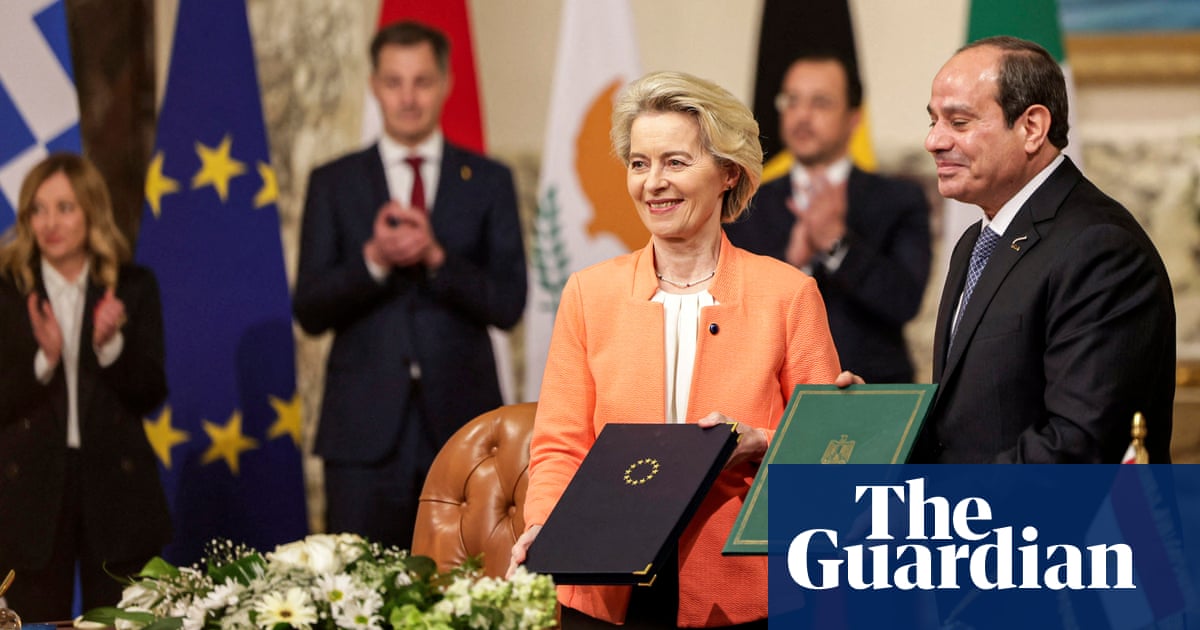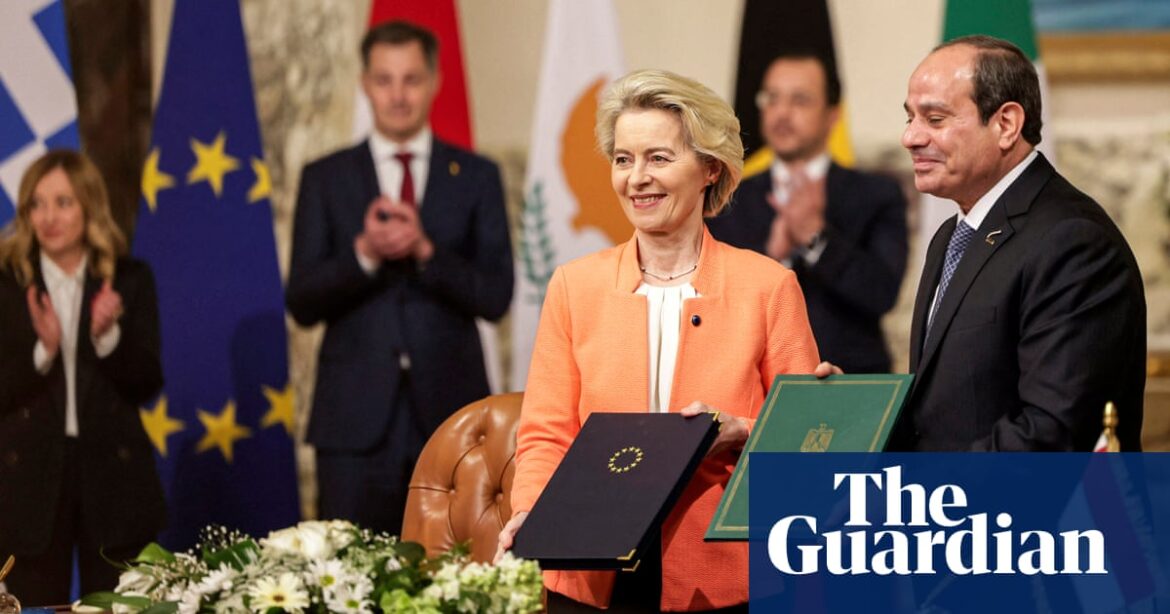
The leaders of the European Union have reached an agreement worth €7.4bn (£6.3bn) with Egypt to provide support for their struggling economy. This is aimed at promoting stability in the “troubled” region and preventing another migration crisis in Europe.
The partnership between the European Union and Egypt for a duration of three years includes a sum of €5 billion in lenient loans to aid economic transformations, €1.8 billion to bolster investments from the private sector, and €600 million in donations, with €200 million dedicated to managing migration.
This comes shortly after the European Parliament accused Brussels of funding authoritarian leaders due to a previous agreement with Tunisia in the previous year.
The Italian prime minister, Giorgia Meloni, stated that six EU leaders traveled to Cairo on Sunday as a result of successful diplomatic efforts between the EU and Egypt over the past few months.
Ursula von der Leyen, the leader of the delegation from the European Commission, stated that the agreement highlighted Egypt’s crucial positioning in an unstable region and the important contribution it makes to regional stability.
During the occurrence, she took the opportunity to once again request a ceasefire in Gaza, the liberation of all captives, and immediate support for the Palestinian people. “The ongoing war in Gaza and the disastrous humanitarian crisis deeply troubles all of us. Gaza is on the brink of famine and we must not allow that to happen. It is imperative to quickly negotiate a ceasefire that not only frees the hostages but also facilitates the delivery of much-needed humanitarian aid to Gaza,” she stated.
Together with Meloni, she met with the president of Egypt, Abdel Fatah al-Sisi, along with the prime ministers of Greece, Austria, Cyprus, and Belgium.
“The presence of six European leaders today shows how deeply we value our relationship. We share our strategic interests in stability and prosperity,” Von der Leyen told Sisi. “And given your political and economic weight as well as your strategic location in a very troubled neighbourhood, the importance of our relations will only increase over time.”
The three-year agreement is part of the bloc’s latest attempt to stop refugees crossing the Mediterranean but is much broader in scope than last year’s controversial €150m deal with Tunisia.
Meloni commended Sisi for Egypt’s collaboration with the US and Qatar in ongoing efforts to resolve the conflict in Gaza. She also mentioned the pressing topic of migration, which holds great political significance within the country.
According to her, in order to discourage individuals in the global south from migrating to Europe, the global north should not only take action against human trafficking groups, but also support the empowerment and economic growth of African nations. She stated that this is precisely the approach being taken presently.
The Prime Minister of Belgium, Alexander De Croo, took the opportunity to urge Israel. He expressed that the situation in Gaza is not acceptable and mentioned that the international court of justice has issued a temporary ruling ordering Israel to allow more access for humanitarian aid. However, he pointed out that the reality is quite the opposite.
Many European governments have expressed concern over the potential for instability in Egypt, a nation with a population of 106 million that has been facing challenges in obtaining foreign currency. Due to economic struggles and poverty, there has been a growing trend of people leaving the country in recent times.
Avoid the promotional emails in the newsletter.
after newsletter promotion
Greece and Italy have expressed worry about the potential for a new refugee crisis, especially due to the influx of refugees from Gaza and in Egypt. The UN’s International Organization for Migration reports that Egypt currently houses around 9 million refugees, including 4 million from Sudan and 1.5 million from Syria.
Kyriakos Mitsotakis, the current prime minister of Greece, Karl Nehammer, the chancellor of Austria, and Nikos Christodoulides, the president of Cyprus, joined Von der Leyen, Meloni, and De Croo in Egypt.
According to Human Rights Watch, the agreement would “incentivize Egypt’s authoritarian ruler.”
According to reports, Sisi has maintained a firm control over Egypt since taking over through a coup in 2013 and then being elected as president in 2014. His administrations have been described as heavily oppressive, with a strong crackdown on dissent, imprisonment of dissenters, and censorship of media and civil organizations.
A statement declared that the EU is now offering renewed backing for the ongoing severe oppression.
Following intense criticism from Members of the European Parliament on Wednesday, the European Union stated its efforts to collaborate with neighboring countries and promote the advancement of democracy and human rights through partnerships, instead of severing ties with them.
The four-page statement made by both parties contained promises regarding human rights. They pledged to continue their efforts in promoting democracy, basic freedoms, human rights, gender equality, and equal opportunities, as previously agreed upon in the partnership priorities.
Source: theguardian.com



